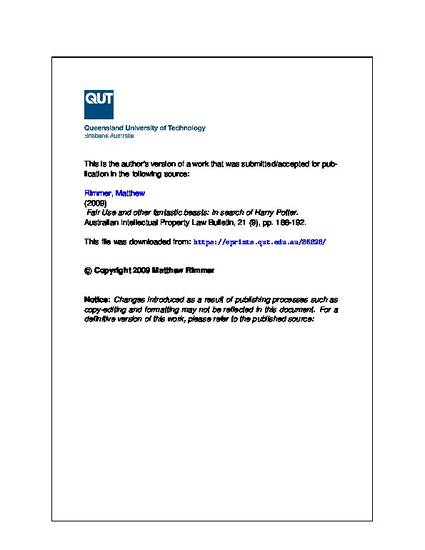
Popular Press
Fair Use and Other Fantastic Beasts: In Search of Harry Potter
Australian Intellectual Property Law Bulletin
(2009)
Abstract
In the landmark 2008 case Warner Bros and JK Rowling v RDR Books, Patterson J of the US District Court for the Southern District of New York held that the publishers of the Harry Potter Lexicon infringed the copyright of JK Rowling and Warner Brothers in such works as the Harry Potter series, Fantastic Beasts & Where to Find Them and Quidditch Through the Ages.
As recounted in an earlier piece, the Harry Potter Lexicon is a reference guide created by Steven Vander Ark, a former librarian from a middle school in Michigan. This companion text was described by the court in these terms:
The Lexicon is an A-to-Z guide to the creatures, characters, objects, events, and places that exist in the world of Harry Potter. As received by the Court in evidence, the Lexicon manuscript is more than 400 type-written pages long and contains 2,437 entries organized alphabetically… The Lexicon entries cull every item and character that appears in the Harry Potter works, no matter if it plays a significant or insignificant role in the story.
Steven Vander Ark was commissioned by RDR Books to condense his Harry Potter fan site, the Harry Potter Lexicon, into book form. Ark agreed, and provided the publisher with a text version of the work. The resulting work was comparable to other companion books to fantasy series, such as Paul F. Ford’s Companion to Narnia: A Complete Guide to the Magical World of CS Lewis’s The Chronicles of Narnia and George Beahm’s Fact, Fiction, and Folklore in Harry Potter’s World: An Unofficial Guide.
After RDR Books announced its intention to publish the reference book, JK Rowling and Warner Brothers brought a legal action in the US District Court for the Southern District of New York, alleging that the publishers of the Harry Potter Lexicon were in breach of copyright, trade marks, and unfair competition laws. After pre-trial orders, the parties narrowed the claims and defences to be tried: the plaintiffs pursued only their claims for copyright infringement and statutory damages. In response, RDR Books raised the affirmative defences of fair use, copyright misuse, and unclean hands.
In the course of his judgment, Patterson J paid close attention to past precedents dealing with guidebooks to Seinfeld, Star Trek, and Twin Peaks. His Honour held that the case of the Harry Potter Lexicon could be distinguished from these past precedents:
The Lexicon seeks not to entertain but also to aid the reader or student of Harry Potter by providing references about the elements encountered in the series. The Lexicon’s purpose as a reference guide also distinguishes it from the books at issue in Twin Peaks and Paramount Pictures. The judge also acknowledged a range of other precedents on copyright law and fair use relating to biographies of US presidents, and Elvis; derivative works, such as the Beanie Babies; as well as books illustrating the work of the Grateful Dead and parodies of Gone with the Wind.
In the key ratio in his ruling in Warner Bros and JK Rowling v RDR Books, Patterson J held:
In striking the balance between the property rights of original authors and the freedom of expression of secondary authors, reference guides to works of literature should generally be encouraged by copyright law as they provide a benefit to readers and students; but to borrow from Rowling’s overstated views, they should not be permitted to “plunder” the works of original authors, “without paying the customary price” lest original authors lose incentive to create new works that will also benefit the public interest.
Keywords
- Copyright Law,
- Reference Books,
- Fan Fiction,
- Literary Criticism,
- Harry potter,
- Fantastic Beasts,
- fair use
Disciplines
Publication Date
April, 2009
Citation Information
Matthew Rimmer. "Fair Use and Other Fantastic Beasts: In Search of Harry Potter" Australian Intellectual Property Law Bulletin Vol. 21 Iss. 9 (2009) p. 188 - 192 Available at: http://works.bepress.com/matthew_rimmer/73/
